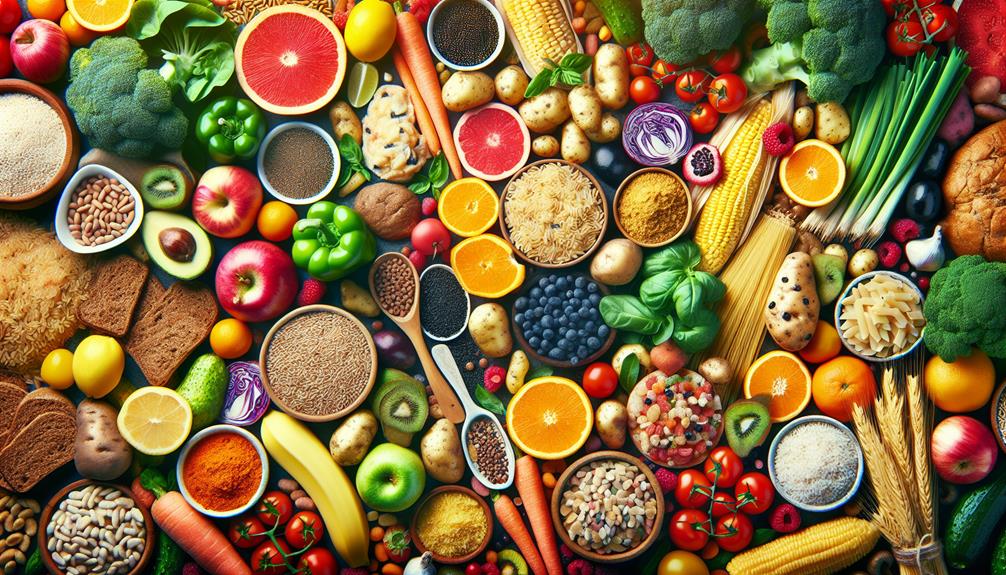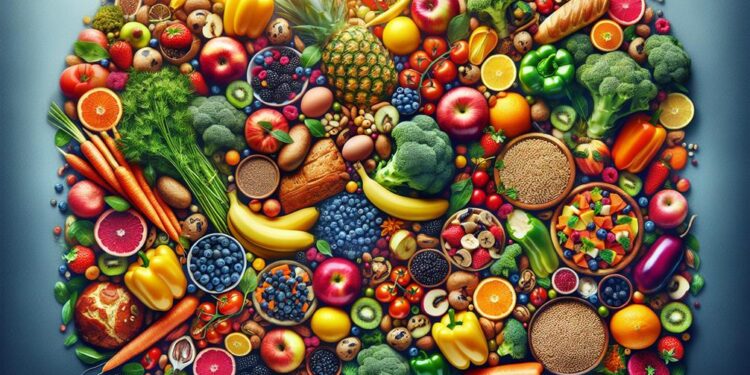Are you tired of being bombarded with conflicting information about what you should and shouldn't eat? It's time to separate fact from fiction and dispel the food myths that have been circulating for far too long. From the notorious egg and cholesterol myth to the supposed dangers of red meat, this discussion aims to set the record straight on nutrition. Prepare to have your beliefs challenged and your understanding of food revolutionized. With scientific evidence and expert opinions, we will unravel the truth behind common food misconceptions and help you make informed choices for a healthier lifestyle. Get ready to rethink everything you thought you knew about nutrition.
Key Takeaways
- Eggs are not associated with heart disease and can be consumed in moderation.
- Red meat can be a good source of essential nutrients, but moderation is important and cooking methods can affect its health impact.
- The quality of carbohydrates is important for long-term health, and low carb diets are not necessary for everyone.
- Consuming excessive sugar can lead to various health risks, and natural substitutes can be healthier options.
Debunking the Egg and Cholesterol Myth
Debunking the egg and cholesterol myth is crucial for understanding the true impact of eggs on your health. For years, eggs have been vilified due to their high cholesterol content, with concerns that this could lead to an increased risk of heart disease. However, recent research has debunked this myth, revealing that there is no significant association between egg consumption and heart disease.
Studies have shown that the cholesterol in eggs has only a minimal effect on blood cholesterol levels. In fact, dietary cholesterol has a limited impact on blood cholesterol compared to saturated and trans fats. The American Heart Association now recommends that individuals can safely consume up to seven eggs per week as part of a healthy diet.
Eggs are a nutrient-dense food, packed with high-quality protein, vitamins, minerals, and antioxidants. They are also an excellent source of choline, a nutrient important for brain health. Regular egg consumption has been associated with various health benefits, such as improved eye health, weight management, and reduced risk of certain chronic diseases.
To include eggs in your diet while maintaining heart health, it is essential to focus on overall dietary patterns. Pairing eggs with whole grains, vegetables, and healthy fats can create a balanced and heart-healthy meal. Avoiding excessive consumption of saturated and trans fats is key to reducing the risk of heart disease, rather than eliminating eggs from your diet.
The Truth About Red Meat and Health
Red meat has long been a topic of debate when it comes to its impact on our health. Let's explore the truth about red meat and its effects on our well-being.
- Red meat consumption effects:
- Nutrient-rich: Red meat is a good source of essential nutrients, including protein, iron, zinc, and B vitamins.
- Moderation is key: While red meat can be a part of a healthy diet, it's important to consume it in moderation. Excessive intake has been linked to certain health risks.
- Cooking methods matter: The way we prepare red meat can also impact its health effects. Grilling or pan-frying at high temperatures can produce compounds that may be harmful when consumed in excess.
- Red meat and heart disease correlation:
- Mixed evidence: Studies examining the relationship between red meat consumption and heart disease have yielded mixed results. While some studies suggest a correlation, others have found no significant association.
- Other factors at play: It's important to consider other lifestyle factors that may contribute to heart disease, such as overall diet quality, exercise, smoking, and genetics.
Clearing the Confusion on Carbohydrates

Carbohydrates are an essential macronutrient that plays a crucial role in providing energy for our bodies. Despite their importance, there is a lot of confusion surrounding carbohydrates, particularly in relation to low carb diets and the glycemic index.
Low carb diets have gained popularity in recent years, with many people believing that reducing carbohydrate intake is the key to weight loss. While it is true that reducing carbohydrates can lead to initial weight loss, it is important to note that not all carbohydrates are created equal. Focusing on the quality of carbohydrates, rather than simply reducing overall intake, is essential for long-term health and weight management.
The glycemic index (GI) is a tool that ranks carbohydrates based on their effect on blood sugar levels. It is often misunderstood that all high GI carbohydrates should be avoided. However, it is important to consider the overall context of a meal. Combining high GI carbohydrates with protein, fiber, and healthy fats can help slow down the digestion and absorption of carbohydrates, preventing sharp spikes in blood sugar levels.
Exposing the Hidden Dangers of Sugar
Sugar is often hidden in many foods and beverages, posing a range of potential health risks that may not be immediately apparent. It's important to be aware of the hidden sugar content in our diets to make informed choices for our well-being. Here are a few things you should know:
- Hidden sugar: Many processed foods, such as flavored yogurts, cereals, and sauces, contain added sugars that can contribute to excessive calorie intake and lead to weight gain. Be sure to check food labels for sneaky names like high fructose corn syrup, cane sugar, or maltose, which all ultimately contribute to your sugar intake.
- Negative health effects: Consuming too much sugar can increase your risk of obesity, type 2 diabetes, heart disease, and tooth decay. It's easy to underestimate the amount of sugar we consume, as it is often added to foods that don't necessarily taste sweet, like bread or salad dressings. Being mindful of hidden sugar can help you make healthier choices.
- Sugar substitutes: While it may be tempting to replace sugar with artificial sweeteners, it's important to use them in moderation. Some studies suggest that artificial sweeteners may lead to cravings for more sugary foods and drinks. Opt for natural substitutes like stevia or monk fruit, which have fewer calories and may be a better option for those looking to reduce their sugar intake.
Unveiling the Reality of Superfoods

Now that you're aware of the hidden dangers of sugar, let's explore the fascinating world of superfoods and separate fact from fiction. Superfoods have gained popularity for their potential health benefits. One such superfood that has captured attention is dark chocolate. But what are the actual benefits of dark chocolate? Research suggests that dark chocolate, particularly the ones with high cocoa content, contains antioxidants that can help reduce inflammation and improve heart health. It may also enhance brain function and lower the risk of certain chronic diseases. However, it's important to remember that moderation is key. While dark chocolate can offer health benefits, it is still high in calories and should be consumed in moderation as part of a balanced diet.
Another superfood that often finds itself in the spotlight is gluten. Gluten is a mixture of proteins found in wheat and other grains such as barley and rye. There is a common misconception that gluten is harmful to everyone. However, the truth is that only a small percentage of the population has a condition called celiac disease, which requires strict avoidance of gluten. For the majority of people, consuming gluten is not a problem. In fact, whole grains that contain gluten can provide essential nutrients such as fiber, vitamins, and minerals. It is important to note that if you suspect you have a gluten intolerance or sensitivity, it is best to consult a healthcare professional for proper diagnosis and guidance.
Frequently Asked Questions
Can Eating Eggs Really Increase Cholesterol Levels?
Eating eggs won't increase your cholesterol levels as much as you think. The truth is that most people can enjoy eggs as part of a healthy diet without worrying about their heart health.
Is Red Meat Really Bad for Our Health?
Eating red meat won't instantly kill you, but let's not ignore the facts. Excessive red meat consumption has been linked to increased risk of heart disease, cancer, and other health problems. Moderation is key.
Are All Carbohydrates Bad for Our Diet?
Carbohydrate intake is an important part of a balanced diet. Not all carbohydrates are bad for you. Understanding the glycemic index can help you make informed choices about which ones to include in your diet.
Are Natural Sugars and Artificial Sugars Equally Harmful?
Natural sugars and artificial sugars are not equally harmful. Natural sugars, found in fruits and honey, provide essential nutrients. Artificial sugars, like those in sodas and processed foods, can lead to weight gain and health issues. Understanding metabolism is key to making informed choices.
Do Superfoods Really Have Extraordinary Health Benefits?
Superfoods are often marketed as having extraordinary health benefits, but the reality is that there is no scientific evidence to support these claims. Eating a balanced diet that includes a variety of nutrient-dense foods is the key to good health.
Conclusion
In conclusion, it's crucial to separate fact from fiction when it comes to food myths. By debunking the egg and cholesterol myth, clarifying the truth about red meat, carbohydrates, and sugar, and revealing the reality of superfoods, we can make informed choices about our nutrition. Remember, knowledge is power and it's better to be safe than sorry. So, don't judge a book by its cover or fall for the latest food fad, but rather rely on evidence-based information to make practical and beneficial dietary decisions.













